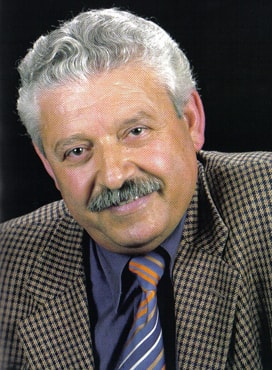“ When someone suffers a sexual problem he needs to go to a doctor who is a sexology expert, a urologist in general, who dominates both the patient's organic and mental aspects ”
Interview of the Dr. Wafik by the journalist Angel Font (personatges de catalunya)
Dr. Mohamad Wafik Al-Wattar Al-Sabbach
He was born in Beirut and raised in Homs ( Syria ) but at the early age of 20 years old he decided to venture into an unknown land, to a new life full of uncertainties. Son of a Lebanese mother and a Syrian father, he left his city of birth with a very clear purpose: “The neighbours and friends of my town knew that when they suffered a slight wound they could come to my home, where I would take care of them with my few instruments, mercurochrome, alcohol and cotton.”

This daring vocation began to grow and confirm itself throughout the years until he took the step to go study Medicine in a foreign country, in a country where this subject was highly developed. For him a fundamental requisite was to go to a land where it would be easy to socially integrate.
“Even though many people in Lebanon and Syria preferred other countries, I chose Spain because we Arabs feel very close to this country especially regarding social and relational similarities, and also because I had a friend who lived in Granada. In addition, I had studied German and English, which was supposed to help me learn, a new language. In fact, I was granted a scholarship to study Medicine in Germany , but due to the Six-Day War in 1967 all diplomatic relations were broken off with this country. Then the idea of going to Spain started to confirm itself. My main aim was to study Medicine and return later to my country to practise my profession. I arrived to Barcelona on a Turkish boat in 1970 and the only word I knew then was: medicina (medicine). I also had to get over a two-fold language barrier, that of Spanish and Catalan. I acquired a fairly good level in Spanish in a few months, which allowed me to take the language exam that would allow me to enrol at the University of Barcelona . My anxiety to study and learn together with my learning capacity helped me graduate in Medicine and Surgery in the year 1977. After that I applied for a specialist training at the Hospital de Bellvitge. My professor was Doctor Narcís Serrallach Milá, chief of the Urology service. I made up my mind to become a urologist, a very complete speciality which embraces Internal Medicine and Surgery.”
Doctor Mohamad Wafik Al-Wattar has settled down in Catalonia and his dream of becoming a doctor has come true. A circle of friends with whom he maintains a close relationship. However, he has not forgotten his roots, his family and friends from Damascus and Lebanon and he visits them quite often. In Barcelona , he has been able to develop within the field of medicine and he has specialized in some very important subfields: urology, andrology and sexology.
“When I was a resident at Hospital de Bellvitge I met Doctor Francisco Bedós Casals, an eminent specialist. He was a reference for me in the way he carried out his work how he operated and the way in which he treated his patients. I was working at a clinic in Sabadell , where I studied surgery techniques in depth. Later on, I entered as a doctor in General Medicine in Rubí. These were hard years because I had to work a lot to be able to support my family. After this period of time I managed to find a vacant position as a urologist in a state health-service hospital and later on I opened a private consulting room”.
He has performed surgery at Clínica Creu in Sabadell and at Clínica Tres Torres in Barcelona in collaboration with Doctor Ramon Serrate, chief of the urology service. Presently he operates at the Policlínica de Barcelona and at the Hospital de Barcelona.
As regards kidney, bladder, urinary infections, incontinence and other pathologies, they can affect both men and women. The same thing happens with the diseases which andrology and sexology - two of the doctor's main specialities - deal with.
“They are specialities that have witnessed huge progress within the last few years in connection with diagnosis, treatment, prevention and psychosomatics. I graduated in sexology and erectile dysfunctions. It was important to give an answer to certain problems that became more and more usual. One of the treatments I offer is directed to solve masculine impotence. I was in Australia for a while to learn Professor Jack Vaismann's formula on impotence. When someone suffers a sexual problem they need to go to a doctor who is a sexology expert, a urologist in general, who dominates both the patient's organic and mental aspects. 70% of the dysfunctions have a physical or organic origin. In the last Congress on dysfunctions we heard that out of three men, one has erectile problems. It is a real problem that needs specialists who are experts in these techniques”.
Sometimes it is the woman who goes to the sexologist to resolve her problems or her partner's.
The doctor has also been trained in the United States with Dr. Norman Sohn in a new technique, called proctology, which allows the permanent elimination of haemorrhoids without surgery.
“In 1996 I was interested in this technique invented by Doctor Kazumasa Morinaga from Japan and perfected by Doctor Mattias Scheyer from Austria and Doctor Jorge Karam from Lebanon, with whom I work. It is fairly easy and it is known as a haemorrhoid artery ligature through the Doppler. With local or regional anaesthetics, the device is inserted through the rectum and it detects the artery that feeds the haemorrhoid through the Doppler, then it puts a suture stitch to strangulate the blood supply. With an operation that takes just fifteen minutes we can eradicate this illness which affects many people. I have performed over 400 operations in Barcelona , where I am the only experienced specialist in this field, and I still perform them. The person who has been operated on can go home three hours after the intervention and live a normal life on the following day.”
Figures show that there are more and more people who suffer cancer related to organs treated by urology.
“ “The situation is fairly worrying but we as doctors have to be aware that through prevention, usual pathologies can be detected on time, like for instance prostate cancer, and treat them efficiently. Prevention is the best cure. In 1996 I invented a card for my patients where I keep track of the tests that urologists do: rectal tact, blood test (PSA), bladder and prostate ultrasound, etc. It is important to have an annual examination, like women when they consult a gynaecologist. It is recommended that men begin these examinations at the age of forty, however they could start a lot earlier since the prostate is a gland that we (men) have from the day we are born”.
I presented the card in 2003 in Damascus, at the occasion of the celebration of the 7th Hispanic-Syrian Congress.
“I would like for this document to be introduced in the health system”.




























